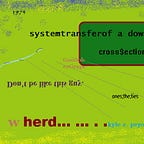Numbers
Numbers have become a trend again on social media. In general, the majority will always exchange ways of using and thinking about numbers. That concept might be called "transposition" or "displacement" - exchanging, switching, one-over-the-other. I want to discuss a few general concepts and also the specific numbers.
* Specific *
One. Where else would we start? Well, there’s zero. In fact, there are also negative numbers - electricians' favorites? What’s more, there are imaginary numbers - the ones that are used as an "intermediate" tool in order to solve some other problem. The Buddha says, "You are ONE!" As you can imagine, this concept can easily, but boringly, be exploited. What can anybody do with one?
They say that if you don’t practice math, you lose your skill. They also say that after the age of 30, forget it completely. Give up. Yet another thing they say is that physics is all about math. Three strikes and we’re out.
Wait a minute. I skipped two. Two is a number of love. In my opinion, true love makes two flow into three, four and then infinity. Unfortunately, in reality, two often drips back down to one. Then where?
Two is a number of a bicycle. Hey, you got company there. In fact, you need company there. It's awfully hard to ride a unicycle.
Two is common in biology. You have two eyes, in case you need a second opinion. Two arms, two legs, two ears, two sex glands and two nipples (there's two leading to three again.) I think it's interesting how the optical nerves cross before attaching to the brain. Then there's upside-downness, far-sightedness and geometrical shapes that apparently fluctuate depending on how much light you shed on them. I could be wrong about these things. In fact, I often get any two concepts backward. Don't worry. Today's world is filled with extremely pedantic fact-checkers.
Before we get to three, let's think about two-and-a-half. That's the number of the transistor - two circuits connected to form a complete (third) circuit, but what will turn it "on"? Flip a switch, maybe. Go for it. While you're at it, connect a whole bunch of those things together so that the output of one is the input of another. It might be fun.
Four. Four is like two. There's "four", "for" and "fore", too. When I was a kid, a teasing saying went, "Four-eyes!" toward someone who wore glasses. The rebuttal: "Four eyes are better than two!" The original point: "Not when two don't work!" Even that doesn't make sense. All four of them don't work alone. Which brings us to five.
Thumbs. (Can we skip to ten yet?) Is your thumb your first finger? No, that's your index finger. Wait. An index is like a catalog, not a finger. I'm confused again.
I like six. It reminds me of a six-pack and sometimes I wish I had one type and not the other. It's because I drink the one type that I don't have the other. We might as well skip to 12 now.
Seven. Now we're getting serious and stupid. Superstitious people like seven. Now let's stop and think about how we got to writing numbers in the first place, let alone how lucky seven got to be. "1" is like the simplest mark with a little flag added to it (and maybe a base, too.) Seven doesn't seem to be much different from one. I don't get it.
Eight sounds like "ate", which is what I'm doing right now - eighting.
Nine, ten, eleven . . . let's continue this some other time.
* General *
Numbers are an irresistible source of sensationalism. Statisticians in sports, actuaries in risk, pedantics in academics; sensationalism is everywhere. It provides proof of our arrogance, but, as with any pursuit that involves arrogance, it can backfire. Should we blame the numbers?
In database philosophy, there are relationships. It's interesting how relationships, numbers and scientific concepts can closely correspond to our daily lives. One-to-many is an obvious example. For good or bad reasons, people can't help but to group together. Naturally, a corresponding step is to single out an individual. Heaven help us all then.
In my opinion, the first species of living things started out with many individuals and also continued with many individuals. I also believe the universe to be infinite in time and space. That would mean that life is probably also infinite. Ehh, if you hook it all together, maybe. Then that would lead to pondering non-physical life.
One of my favorite concepts in the field of numbers, (and after all this hoopla, you might like it, too): random. In computer programming, even a random-number-generator has to start somewhere. It's usually called a seed. It can be a date, the current temperature or the 3rd digit in your team's disastrous loss to that mediocre team. Aww. Boo-hoo-hoo.
Let's continue this another time. After all, another one of my favorite concepts is infinity.
